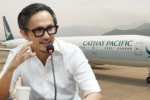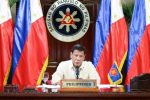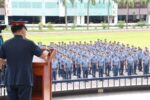Bong Go commends issuance of EO institutionalizing access to protection services for refugees, stateless persons, and asylum seekers in the Philippines
Senator Christopher “Bong” Go has commended President Rodrigo Duterte for issuing Executive Order No. 163 institutionalizing access to protection services for refugees, stateless persons, and asylum seekers.
The EO, dated February 28 and released on March 2, tasks the state to closely monitor and ensure full protection of the rights of persons of concern (POCs) to liberty and security, and freedom of movement.
“Isa po sa mga ipinagmamalaking katangian ng mga Pilipino ang ating malasakit sa kapwa tao, kababayan man natin ito o hindi. Kaya naman po kinokomendahan ko si Pangulong Duterte at ang gobyerno sa napakagandang polisiyang ito na nagpapakita sa ating pagiging likas na matulungin,” said Go.
The senator noted that Duterte has always had a heart for the oppressed even while he was still the mayor of Davao City, saying, “Malapit ang puso ni Pangulo sa mga inaabuso o inaapi. Hindi po niya maatim na hindi sila tulungan.”
In accordance with the 1951 United Nation Convention Relating to the Status of Refugees and its 1967 Protocol, 1954 UN Convention Relating to the Status of Stateless Person, and 1961 Convention on the Reduction of Statelessness, the EO provides the minimum standards for the treatment of POCs.
These shall include the provision of access to socioeconomic services, social security benefits, gainful employment and humane working conditions, education, participation in judicial and administrative citizenship proceedings, legal assistance and access to courts, and freedom of religion.
Meanwhile, POCs have the “concomitant obligation to abide by the laws and regulations of the country, including measures relating to the protection of public health, and maintenance of public order and national security.”
The EO also creates the Inter-Agency Committee on the Protection of Refugees, Stateless Persons and Asylum Seekers which is tasked with the central role of assuring the provision of relevant services and assistance to POCs.
The Committee may enlist the assistance of other government entities, including state universities and colleges and local government units, in carrying out its duties.
LGUs are likewise tasked to ensure the smooth integration of POCs into their communities. They are also encouraged to make necessary programs and services available and conduct information awareness campaigns.
“Gamitin din po natin ang pagkakataong ito upang ipakita ang katangi-tangi at ipinagmamalaki nating Filipino hospitality na kilala sa buong mundo,” remarked Go.
“Patunayan natin na hindi lamang maganda ang ating bansa kundi matulungin din at mapagmalasakit ang mga mamamayan nito,” he added.
According to the UN High Commissioner for Refugees’ website, the Philippines has a long history of welcoming refugees, dating way back to when it became a State Party to the 1951 UN Convention. It also identified ‘nine waves’ of refugees who were admitted to the archipelago between 1920 and 2000.
Among them were white Russians who fled persecution from “red Russians” at the end of World War I; Jewish refugees escaping Nazi persecution in 1934; Spanish Republicans fleeing at the end of the Spanish Civil War in 1939; Chinese immigrants seeking refuge after the Chinese Civil War in 1940; the “Tiempo Ruso”, a second wave of 6,000 white Russians in 1947; Vietnamese refugees fleeing the Vietnam War from 1975 to 1992; and thousands of Iranians studying and working in the country who sought refugee status in the Philippines after the Iranian Revolution in the late 1970s, among others.
In 2019, Duterte expressed his willingness to help Rohingya refugees fleeing persecution in Myanmar. He also offered help to Afghan refugees last year.






